Opinion
Lalith: A true leader who opened many a window for others
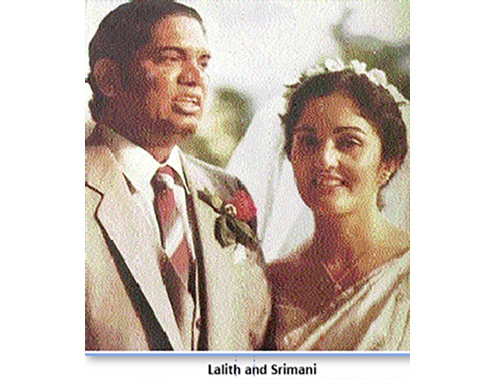
84th birth anniversary:
by Shyamila Perera
former coordination Secretary
Always remembered by what he has done- LALITH ATHULATHMUDALI
Lalith Athulathmudali was indefatigable in his quest for knowledge and was continuously opening windows for our youth to the modern world of knowledge and technology. With the Mahapola concept, he demonstrated the fact that school was not merely an institution concerned with distributing prescribed learning but rather that it was motivated towards creating an awareness of ever-expanding human horizon in the world of today and tomorrow. Communication and information were central to Lalith’s vision of realizing his goals. His steadfast ambition was that our youth be equipped to take their place in the global village of advancing technology.
Lalith’s enduring mission was to provide facilities for our young men and women with high ideals and higher hopes emerging each year on the threshold of life with no hope of assistance, falling back in frustration because they were being defeated by the system. The creation of the Mahapola Scholarship Trust Fund was a major step towards defeating the cynicism of the system. But even that was insufficient for Lalith. He wanted more for these young men and women particularly because he truly believed that the eventual alleviation of poverty could only be achieved through enhanced education and narrowing the gap in educational facilities. Through the provision of a dynamic educational system complete with English as its cementing language and developing technical and vocational skills to meet the mismatch in employment market.
Lalith did not overlook the business community but created lucrative openings for them. The business community benefitted by his pragmatic vision and innovative ideas. Modernization of commercial laws, Export incentives, introduction of the Export production villages, Exporter’s forum and the Presidential Export awards, lying emphasis on exports, Development of the Port as a modern container port and equipping it for transhipment are some of the few initiatives he took to develop the economy.
In his short span, as the Minister of Agriculture he introduced many novel ideas such as Agricultural Export villages, the soil and climate cropping system and the concept of growing for the market. His stint as the Education portfolio he introduced many reforms with the student being the priority.
His political ideology for the country was of national, secularism, democracy and market economy with a safety net for the less privileged. He insisted that the voice of the people, their needs, their aspirations and their priorities must become the corner stone of the edifice of planning. Scholarships for post-graduate studies, grants and other special awards will be included in to the Foundation’s educational programmes.
It’s appropriate to lookback at his life’s work and vision, pragmatism and the vigour he displayed he displayed during his relatively short span of life.
Always Remembered by what he has done
A short summery of his work and achievements is appropriate to be remembered: As Minister of Trade from 1977 (August)-1983 March) he Implemented the open market economy, introduced the concept of bonded warehousing for essential foods to ensure food security, ensured continuous supply of food and essentials to the people amidst of riots and crisis (1983) through Trade Ministry supply chain, introduced new laws for consumer protection, Consumer Credit , Code of Intellectual Property , New Companies Act, Insurance (Special Provisions) Act, Sri Lanka Export Credit Insurance Act, Export Development Board Law, Young Inventors Commission among others. He restructured the CWE to become a profitable Organization and a self-service retail network, re built the Lanka Milk foods factory with modern facilities (after the Welisara fire). Effected positive changes in the export sector and established a with Export information Centre, Exporter’s Forum, Presidential Export Awards, Export Production Village Concept,etc. As Minister of PORTS and SHIPPING (1978- 1988) he spearheaded the unification of Port activities by creating the Sri Lanka Ports Authority, introduced transhipment, modernized the marine laws, Infrastructure modernization and development of the Port, pioneered the Containerization, the development of the QEQ, Construction of the JAYA Terminal as the first modern fully computerized terminal. Ports became a revenue earning institutions for the first time during his tenure & achieved 26th position among world ports (139th in 1980) He established the Mahapola- SLPA Technical Training Institute and completed construction of the Sambudha Jayanthi Stupa during his term. MAHAPOLA (1980) The Mahapola concept that he introduced was the closest to his heart. he created a fund with a personal contribution. In order to collect funds for this programme he introduced the Mahapola Lottery. Later with his foresight The MTF became a co-partner of the Development Lottery initiated by the Ministry of Plan Implementation by investing 50% of the capital which guaranteed continuity of the scholarships. Mahapola Trade Fairs and Educational Exhibitions were introduced to create a link between education and trade. Mahapola Trust Fund was initially created by a private deed and thereafter enacted as the Mahapola Higher Education Scholarship Trust Fund by an Act of Parliament to provide scholarships to the needy undergraduates. The “Gnana Pradeepa” fund provided infrastructure facilities to rural Schools. The “Gnana Dharshana” Seminar programme Which he personally participated, benefitted of students of economics & commerce. He acquired a 25-acre block of land to the Trust in order to establish the Mahapola University Complex (currently occupied by SLIIT)
With the onset of the Eelam war NATIONAL SECURITY and DEFENCE (1983-1988) was a diverse subject for this intellectual. However, he accepted the challenge. Restructuring of the Armed forces from Ceremonial to a fully-fledged combat forces, recruitment, training, equipping and establishing new units was his priority. He was Instrumental in the establishment of the Special Task Force, Rapid Deployment Force, National Auxiliary Force, expanding Commando Units, equipping the Navy with new, modern fast craft to strengthen the protection of the sea routes. The increasing the number of camps in the war zone, teaching of Tamil language to soldiers, welfare schemes for soldiers, boosting the morale of the soldiers by visiting camps regularly were some others he was involved in. He also gave political leadership to the Wadamarachchi operation.
He was the Minister of Agriculture, Livestock and cooperatives for a short stint (1989-1990) The framework for “farming for the Market”, concept of “YALA- for cash- MAHA for rice” evolving cropping systems for different climatic zones and soil conditions, Introduction of Agricultural Export Production Village Scheme Introducing the export oriented agriculture to the farming community, organizing livestock farmers in to co-operative societies, introducing the concept of co-operative banking and insurance business were some of the concepts he introduced to the agriculture sector.
EDUCATION and HIGHER EDUCATION (1990-1991-August). To Lalith Athulathmudali, education as a whole was sine-qua-non of his existence. He believed that an educated society can only be created by a leadership that values education and educated people. Introduction of the concept of equal opportunity for equal ability was his vision. He broad-based opportunities to teach core subjects; science, maths and English with the use of electronic media for education (particularly to benefit rural students) He Introduced a scheme to increase opportunities for technical and vocational education with a graded system in technical education with formal exit points from main stream of education. The teaching of second and third languages in schools and introduction of competency tests, introducing the Tri-lingual alphabet with free school books, introducing Sports as a vocational subject for O/L and A/L, Introducing the Teacher Service and Principals Service, Year-9 Technical Certificate, National Education Commission are some other ideas he introduced during the 15 months of his tenure.
RISE AGAINST AUTOCRACY & THE CRUSADE TO RE ESTABLISH DEMOCRACY (1991 August-1993 April) Lalith Athulathmudali was a democrat in every sense of the word. He spent his formative years in a liberal environment where free thinking, the rule of law, democracy was paramount. However, his liberal thinking did not blind him of the limitations it could have on a developing country like Sri Lanka. He believed that every citizen is equal in dignity and should enjoy the freedom, privileges and basic facilities in equal share. The rule of law should be equal to all from the highest and the lowest in society. Independence of the judiciary has to be protected at any cost. And strived to create a society where “freedom without fear” shall prevail
In pursuance of these goals he sacrificed his precious life on a political platfor April 23 rd, 1993
“Look for WHAT IS RIGHT- not WHO IS RIGHT”
EPITAPH
“He was young enough and tough enough to confront and to enjoy the winds of these times, whether the winds of nature or the winds of political circumstance and national danger; He died of exposure. But in a way that he would have settled for, in the line of duty, with his friends and enemies all around supporting him and shooting at him. It can be said of him, as of few men in like position, that he did not fear the weather and did not trim the sails, but instead challenged the wind itself, to improve its direction and cause it to blow more softly and more kindly over the nation and its people.”
Courtesy- JFK memorial
- News Advertiesment
See Kapruka’s top selling online shopping categories such as Toys, Grocery, Flowers, Birthday Cakes, Fruits, Chocolates, Clothing and Electronics. Also see Kapruka’s unique online services such as Money Remittence,News, Courier/Delivery, Food Delivery and over 700 top brands. Also get products from Amazon & Ebay via Kapruka Gloabal Shop into Sri Lanka.
Opinion
Take Human Rights seriously, not so much the council or office
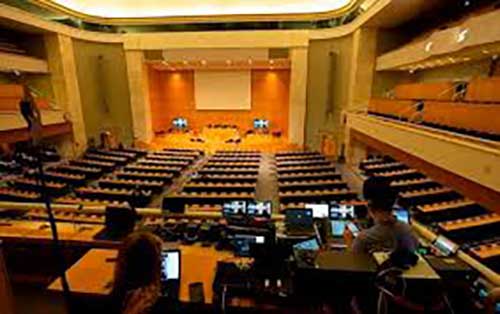
By Dr Laksiri Fernando
The 46th Session of the UN Human Rights Council started on 22 February morning with obvious hiccups. The Office, to mean the Office of the UN High Commissioner for Human Rights, finally decided to hold all sessions virtually online, only the President of the Council and the assistants in the high table sitting at the UN Assembly Hall in Geneva. The President, Ms. Nazhat Shammen Khan, Ambassador from Fiji in Geneva, wearing a saree, was graceful in the chair with empty seats surrounding.
In the opening session, the UN General Assembly President, UN General Secretary, UN High Commissioner for Human Rights, and Head of Foreign Affairs, Switzerland (as the host country), addressed remotely the session. In fact, there was no need for Switzerland to have a special place, as the UN is independent from any host country. Switzerland is fairly ok, however, if this tradition is followed, the UN General Assembly may have to give a special place to the US in New York.
Initial Addresses
UN General Secretary, Antonio Guterres’ address could have been quite exemplary if he gave a proper balance to the developed and developing countries. He talked about racism and fight against racism but did not mention where racism is overwhelmingly rampant (US and Europe) and what to do about it. Outlining the human rights implications of Covid-19 pandemic, he made quite a good analysis. It was nice for him to say, ‘human rights are our blood line (equality), our lifeline (for peace) and our frontline (to fight against violations).’ However, in the fight against violations, he apparently forgot about the ‘blood line’ or the ‘lifeline’ quite necessary not to aggravate situations through partiality and bias. He never talked about the importance of human rights education or promoting human rights awareness in all countries.
His final assault was on Myanmar. Although he did not call ‘genocide,’ he denounced the treatment of Rohingyas as ethnic cleansing without mentioning any terrorist group/s within. His call for the release of Aung San Suu Kyi and other civilian leaders undoubtedly should be a common call of all. However, he did not leave any opening for a dialogue with the military leaders or bring back a dialogue between Aung San and Min Aung, the military leader. With a proper mediation, it is not impossible. Calling for a complete overhaul as the young demonstrators idealistically claim might not be realistic.
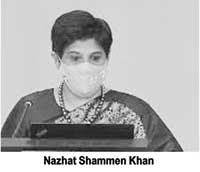 High Commissioner Michelle Bachelet’s address was brief and uncontroversial this time without mentioning any country or region. It is clear by now perhaps she is not the real author of the Report against Sri Lanka, but someone probably hired by the so-called core-group led by Britain. Her major points were related to the coronavirus pandemic trying to highlight some of the socio-economic disparities and imbalances of policy making that have emerged as a result. The neglect of women, minorities, and the marginalized sections of society were emphasized. But the poor was not mentioned. As a former medical doctor, she also opted to highlight some of the medical issues underpinning the crisis.
High Commissioner Michelle Bachelet’s address was brief and uncontroversial this time without mentioning any country or region. It is clear by now perhaps she is not the real author of the Report against Sri Lanka, but someone probably hired by the so-called core-group led by Britain. Her major points were related to the coronavirus pandemic trying to highlight some of the socio-economic disparities and imbalances of policy making that have emerged as a result. The neglect of women, minorities, and the marginalized sections of society were emphasized. But the poor was not mentioned. As a former medical doctor, she also opted to highlight some of the medical issues underpinning the crisis.
Then came the statements from different countries in the first meeting in the following order: Uzbekistan, Colombia, Lithuania, Afghanistan, Poland, Venezuela, Finland, Fiji, Moldova, Georgia, Kazakhstan, Equatorial Guinea, Vietnam, Belgium, and Morocco. The obvious purposes of these statements were different. Some countries were apparently canvassing for getting into the Human Rights Council at the next turn perhaps for the purpose of prestige. Some others were playing regional politics against their perceived enemies. This was very clear when Lithuania and Poland started attacking Russia.
But there were very sincere human rights presentations as well. One was the statement by the President of Afghanistan, Mohammad Ashraf Ghani. He outlined the devastating effects that Afghanistan had to undergo during the last 40 years, because of foreign interferences. The initial support to Taliban by big powers was hinted. His kind appeal was to the UN was to go ‘beyond discourse to practice’ giving equal chance to the poor and the developing countries to involve without discrimination.
Controversial Presentations
China’s Foreign Affairs Minister, Wang Yi, made his presentation almost at the end of the first day. This is apparently the first time that China had directly addressed the Human Rights Council. Beginning with outlining the devastating repercussions of the coronavirus pandemic he stressed that the world should face the challenges through ‘solidarity and cooperation.’ He broadened the concept to human rights solidarity and cooperation. His expressed views were quite different to the others, particularly to the Western ones.
He frankly said that what he expresses are the views of China on human rights without claiming those are absolute truths or forcing others to believe or implement them. There were four main concepts that he put forward before the member countries. First, he said, “We should embrace a human rights philosophy that centres on the people. The people’s interests are where the human rights cause starts and ends.” Second, he said, “we should uphold both universality and particularity of human rights. Peace, development, equity, justice, democracy, and freedom are common values shared by all humanity and recognized by all countries.” “On the other hand,” he said, “countries must promote and protect human rights in light of their national realities and the needs of their people.”
“Third,” he said, “we should systemically advance all aspects of human rights. Human rights are an all-encompassing concept. They include civil and political rights as well as economic, social, and cultural rights.” He then emphasized, “Among them, the rights to subsistence and development are the basic human rights of paramount importance.” Fourth, “we should continue to promote international dialogue and cooperation on human rights. Global human rights governance should be advanced through consultation among all countries.”
It was on the same first day before China, that the United Kingdom launched its barrage against several countries not sparing Sri Lanka. The Foreign Secretary, Dominic Raab, delivered the statement from top to bottom attacking alleged violating countries on human rights. But there was no mentioning of Israel for the repression of Palestinians or the systemic racism rampaging in the United States, including the 6 January attacks on the Capitol by extremist/terrorist groups.
His first sermon was on Myanmar without acknowledging the British atrocities or mismanagement of this poor and diverse country during the colonial period. He was quite jubilant over implementing sanctions and other restrictions over the country. Many sanctions, in my opinion, are extortions. Undoubtedly, Aung San Suu Kyi and other leaders should be released, and democracy restored. This is a task of the whole council and when one or two countries try to grab the credit, there can be obvious reservations of others.
His further scathing attacks were against Belarus, Russia, and China. Some appeared factually correct but not necessarily the approach or the motives genuine. The following is the way he came around Sri Lanka. He said,
“Finally, we will continue to lead action in this Council: on Syria, as we do at each session; on South Sudan; and on Sri Lanka, where we will present a new resolution to maintain the focus on reconciliation and on accountability.”
‘Action’ to him basically means repeatedly passing resolutions, of course imposing economic and other sanctions. He said, “as we do at each session”; like bullying poor or weak countries at each session. Can there be a resolution against Russia or China? I doubt it.
What would be the purpose of presenting a resolution against Sri Lanka? As he said, “to maintain the focus on reconciliation and on accountability.” This will satisfy neither the Tamil militants nor the Sinhalese masses. But it might satisfy the crafty Opposition (proxy of the defeated last government). This is not going to be based on any of the actual measures that Sri Lanka has taken or not taken on reconciliation or accountability. But based on the ‘Authoritarian and Hypocritical Report’ that some anti-Sri Lankans have drafted within the Office of the High Commissioner for Human Rights. This what I have discussed in my last article.
In this context, successful or not, the statement made by the Sri Lanka’s Minister of External Affairs, Dinesh Gunawardena, in rejecting any resolution based on the foxy Report of the Office of the UN High Commissioner for Human Rights, in my concerned opinion, is absolutely correct.
Opinion
President’s energy directives ignored by the Power Ministry: Another Point of View

Dr Tilak Siyambalapitiya
Dr Janaka Rathnasiri laments (The Island 19 Feb 2021) that the Power Ministry has ignored the President’s directive to draw 70% of energy from renewable sources by 2030. I saw the approved costs of electricity production for 2019, published by the Public Utilities Commission (PUCSL).
PUCSL has also approved the prices to sell electricity to customers. Although various customers pay at various “approved” prices, the average income from such “approved” prices in 2019 was Rs 17.02 per unit. It is not only the Ministry, according to Dr Rathnasiri, ignoring the President; PUCSL is also breaking the law, which says prices and approved costs should be equal.
 So there is already an illegal gap of Rs 21.59 minus 17.02 = Rs 4.57 per unit of electricity sold. If electricity prices are not to be increased, as stated by many in the government and PUCSL, let us say the following: Distribution costs should decrease by 0.57 Rs per unit. Generation costs should decrease by Rs 4.00 per unit.
So there is already an illegal gap of Rs 21.59 minus 17.02 = Rs 4.57 per unit of electricity sold. If electricity prices are not to be increased, as stated by many in the government and PUCSL, let us say the following: Distribution costs should decrease by 0.57 Rs per unit. Generation costs should decrease by Rs 4.00 per unit.
PUCSL also published the approved cost of purchasing or producing electricity from various sources for 2019. The actual energy values were different to what was approved, but let us stick to PUCSL approved figures:
I suggest Dr Rathnasiri fills-up the following table, to show how much electricity will cost in 2030 to produce and deliver, if the President’s 70% target is to be achieved and for PUCSL to abide by the law. Let us assume that electricity requirement in 2030 will be double that of 2019.
 Since PUCSL has to save Rs 4 from 13.92, the average selling price for energy should be Rs 13.92 minus 4.00 = Rs 9.92. With a target network loss of 7% (in 2019 it was 8.4%), the average cost of production has to be Rs 9.27 per unit. Eight cages have to be filled-up by Dr Rathnasiri.
Since PUCSL has to save Rs 4 from 13.92, the average selling price for energy should be Rs 13.92 minus 4.00 = Rs 9.92. With a target network loss of 7% (in 2019 it was 8.4%), the average cost of production has to be Rs 9.27 per unit. Eight cages have to be filled-up by Dr Rathnasiri.
In 2012, PUCSL approved the energy cost of electricity produced from coal power to be 6.33 Rs per kWh. In 2019, PUCSL approved 9.89 (56% increase). For renewable energy, it was 13.69 in 2012, and 19.24 in 2019 (a 40% increase, but double the price of electricity from coal fired generation). In 2012, rooftop solar was not paid for: only give and take, but now paid Rs 22, against Rs 9.89 from coal. There seems to be something wrong. The price reductions of renewable energy being promised, being insulated from rupee depreciation, are not happening? Either Sri Lanka must be paying too little for coal, or it may be renewable energy is severely over-priced?
On coal we hear only of some corruption every now and then; so Sri Lanka cannot be paying less than it costs, for coal.
Enough money even to donate
vaccines
 Another reason for the Ministry of Power to ignore the President’s directive may be the Ministry’s previous experience with similar Presidential directives. In 2015, the President at that time cancelled the Sampur coal-fired power plant, and the Ministry faithfully obliged. That President and that Prime Minister then played ball games with more power plants until they were thrown out of power, leaving a two-billion-dollar deficit (still increasing) in the power sector. Not a single power plant of any description was built.
Another reason for the Ministry of Power to ignore the President’s directive may be the Ministry’s previous experience with similar Presidential directives. In 2015, the President at that time cancelled the Sampur coal-fired power plant, and the Ministry faithfully obliged. That President and that Prime Minister then played ball games with more power plants until they were thrown out of power, leaving a two-billion-dollar deficit (still increasing) in the power sector. Not a single power plant of any description was built.
Where is this deficit? You do not have to look far. In the second table, replace 24.43 with 9.89, to reflect what would have happened if Sampur was allowed to be built. The value 12.79 will go down to 8.55, well below the target of Rs 9.27 per unit to produce. Not only would CEB and LECO report profits, but the government too could have asked for an overdraft from CEB to tide over any cash shortfalls in the treasury. All this with no increase in customer prices. Producers of electricity from renewable energy could enjoy the price of 19.24 Rs per unit. And that blooming thing on your rooftop can continue to enjoy Rs 22 per unit. The Minister of Power, whom Dr Rathnasiri wants to replace with an army officer, would have been the happiest.
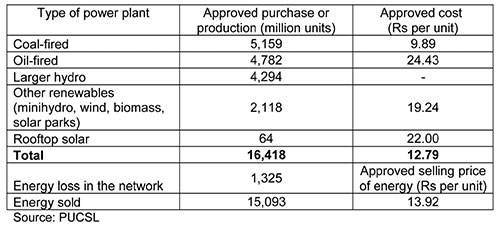 In the absence of Sampur (PUCSL’s letter signed by Chairman Saliya Mathew confirmed cancellation and asked CEB not to build it), PUCSL approved electricity to be produced at Rs 21.59 and sold at Rs 17.02 per unit. The annual loss would be Rs (21.59 – 17.02) x 15,093 = Rs 69 billion per year of approved financial loss. Sri Lanka has a Telecom regulator, an Insurance regulator, a Banking regulator, who never approve prices below costs. Sometime ago the telecom regulator asked the operators to raise the prices, when operators were proposing to reduce prices amidst a price war. But the electricity industry regulator is different: he approves costs amounting to 27% more than the price, not just once but, but continuously for ten long years !
In the absence of Sampur (PUCSL’s letter signed by Chairman Saliya Mathew confirmed cancellation and asked CEB not to build it), PUCSL approved electricity to be produced at Rs 21.59 and sold at Rs 17.02 per unit. The annual loss would be Rs (21.59 – 17.02) x 15,093 = Rs 69 billion per year of approved financial loss. Sri Lanka has a Telecom regulator, an Insurance regulator, a Banking regulator, who never approve prices below costs. Sometime ago the telecom regulator asked the operators to raise the prices, when operators were proposing to reduce prices amidst a price war. But the electricity industry regulator is different: he approves costs amounting to 27% more than the price, not just once but, but continuously for ten long years !
That is 370 million dollars per year as of 2019, the economy is spending, and for years to come, to burn oil (and say we have saved the environment). Did the Minister of Health say we are short of 160 million dollars to buy 40 million doses of the vaccine? Well, being a former Minister of Power, she now knows which Presidential “order” of 2015 is bleeding the economy of 370 million dollars per year, adequate to buy all vaccines and donate an equal amount to a needy country.
Prices are the production costs approved by PUCSL for 2019. The selling price approved by the same PUCSL was Rs 9.27 per unit.
Opinion
Confusion on NGOs and NSOs in Sri Lanka
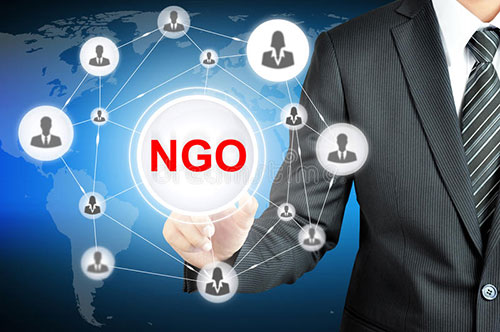
If you listen to politicians and journalists here, you will hear of that curious creature rajya novana sanvidane, a Non-State Organization (NSO). Where do you get them? In the uninstructed and dead minds of those who use those terms. In the real world, where politicians and journalists have developed minds, there are Non-Governmental Organizations (NGO). The United Nations is an organization set up by state parties, not by governments. It is true that agents of states, governments, make the United Nations work or fail. Governments may change but not the states, except rarely. When Eritrea broke away from Ethiopia, a new state was formed and was so recognised by the United Nations. However, the LTTE that tried to set up another state was crushed by the established state that it tried to break away from, and the UN had nothing to do with them.
This entirely unnecessary confusion, created out of ignorance, is so destructive that organizations completely loyal to the existing state, are made to be traitorous outfits, for they are ‘non-state organizations’ within the state. There are citizens of each state, but no citizens of any government. Government is but an instrument of the state. In most states there are organizations, neither of the state nor of government: religious organizations including churches. But none of them is beyond the pale of the state.
Those that speak of rajya novana sanvidane give that name partly because they have no idea of the origin of non-governmental organizations. NGOs came into the limelight, as donor agencies, noticed that some governments, in East Africa, in particular, did not have the capacity and the integrity to use the resources that they provided. They construed, about 1970, that NGOs would be a solution to the problem. Little did they realize that some NGOs themselves would become dens of thieves and brigands. I have not seen any evaluation of the performance of NGOs in any country. There was an incomplete essay written by Dr. Susantha Gunatilleka. NGOs are alternatives to the government, not to the state.
Our Constitution emphatically draws a distinction between the government and state, and lays down that the President is both Head of Government and Head of State (Read Article 2 and Article 30 of the Constitution.) It is as head of state that, he/she is the Commander of the Armed Forces, appoints and receives ambassadors and addresses Parliament annually, when a prorogued Parliament, reconvenes. He/she presides over the Cabinet as head of government. The distinction is most clear, in practice, in Britain where Queen Elizabeth is the head of state and Boris Johnson is the Prime Minister and head of government. However, in principle, Johnson is the Queen’s First Minister appointed by the sovereign, and resigns by advising her of his decision to do so.
In the US and in India the term ‘state’ has special significance. In India there is a ‘rajya sabha’ (the Council of States) whose members represent constituent States and Union Territories. Pretty much the same is true of the United States. In the US, executive power is vested in the President and heads the administration, government in our parlance. The Head of State does not come into the Constitution but those functions that one associates with a head of state are in the US performed by the President of the Republic. The US President does not speak of my state (mage rajaya) but of my administration, (mage anduva). Annually, he addresses Congress on the State of the Union. Our present President must be entirely familiar with all this, having lived there as a citizen of the US for over a decade. It is baffling when someone speaks of a past state as a traitor to that same state. It is probable that a government was a traitor to the state. ‘Treason against the United States, shall consist only in levying war against them, or in adhering to their (States’) enemies, giving them aid and comfort’. That a state was a traitor to the same state is gobbledygook.
Apart from probable confusion that we spoke of in the previous paragraph, it is probable that a president and other members of a government, including members of the governing party here, find it grandiloquent to speak of his/her/their state (mage/ape rajaya), rather than my government (mage anduva) or Sirisena anduva’ and not Sirisena state; it was common to talk of ‘ape anduva’ in 1956; politicians in 1956 were far more literate then than they are now.
When translating from another language, make sure that you understand a bit of the history of the concept that you translate. A public school in the US is not the same as a public school in the UK.
MAHADENAMUTTA









